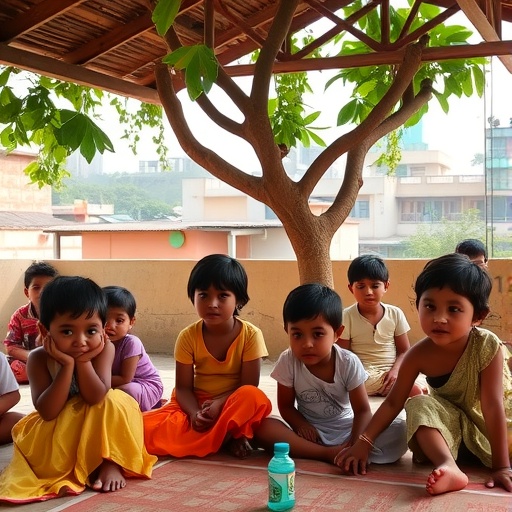In the rapidly evolving arena of early childhood education, the significance of learning environments in urban Anganwadis is garnering extensive attention. A recent study, “Exploring Learning Environments in Urban Anganwadis: Pathways to Early Childhood Development,” authored by Rao, S.F., Kulkarni, B., and Kareddy, S., has delved into the fundamental aspects that comprise these crucial educational spaces in urban settings. As we navigate through these findings, it becomes clear that understanding the learning framework in Anganwadis is essential for shaping the future of early childhood education.
Anganwadis are government-sponsored rural child-care centers in India that serve a dual purpose: they facilitate preschool education and provide health services to children under the age of six. As the urban landscape continues to expand, so does the need for instituting and refining Anganwadis that cater specifically to urban populations. This study exhibits how urbanization has influenced the operational dynamics of Anganwadis, underscoring pivotal pathways for early childhood development in an urban context.
One enlightening aspect presented in the study is the investigation of the socio-economic factors affecting the learning environments within these urban Anganwadis. Urban Anganwadis often reflect the socio-economic diversity of cities, which significantly impacts the quality of education and care each child receives. Areas with high incarceration rates or low-income populations are usually correlated with inadequate educational resources. This study highlights the importance of addressing these disparities to create equal opportunities for all children, irrespective of their socio-economic background.
The researchers have meticulously crafted a framework pointing out various dimensions of learning environments in urban Anganwadis. The layout, resource availability, educator-student interactions, and psychological aspects all work synergistically to enhance the learning experience. It is evident that an enriching learning environment goes beyond mere physical space; it incorporates emotional and cognitive components that play a vital role in nurturing early childhood development.
One cannot overlook the role of trained educators and caretakers in shaping the learning environments within urban Anganwadis. The study underscores that educators with advanced training and resources can significantly impact the holistic development of children. With the necessary skills, educators can create interactive and engaging learning environments that stimulate cognitive abilities, encourage social skills, and promote emotional intelligence among children.
Among the crucial findings of this research are the implications of integrating modern educational methodologies into traditional Anganwadi frameworks. It suggests that adopting technology and innovative teaching strategies can bridge the gap between rural and urban education systems. Utilizing digital tools and multimedia resources can captivate the attention of young learners and foster an atmosphere conducive to exploration and creativity.
Furthermore, the study emphasizes the importance of community involvement in supporting urban Anganwadis. Engaging parents and local stakeholders in the educational process creates a supportive ecosystem for young children. It reiterates that education must transition from being isolated within the walls of institutions into an interconnected community endeavor. Such collaboration can enhance resources, facilitate workshops, and inspire a culture of learning that extends beyond structured classroom settings.
The way forward, according to the findings in this study, beckons for a policy-driven approach aimed at reforming urban Anganwadis. Policymakers need to recognize the unique challenges faced by these centers and provide adequate funding and resources. Implementing evidence-based strategies drawn from comprehensive research can lead to informed decisions that foster the development of urban Anganwadis into spaces of inclusive, equitable, and quality early childhood education.
Ultimately, the study paves the path toward a reimagined vision of urban Anganwadis. Envisioning them not merely as centers of childcare but as vibrant ecosystems capable of propelling children toward a bright future. To foster such an environment, educators, policymakers, and communities must unite to harness the potential found within these urban educational spaces.
In conclusion, Rao, S.F., Kulkarni, B., and Kareddy, S. have provided invaluable insights into the intricacies of learning environments in urban Anganwadis through their evocative study. It prompts a necessary dialogue about enhancing early childhood education and development amidst an urban backdrop, emphasizing that investing in these formative years is indeed an investment in our collective future.
As we reflect on these findings, it becomes evident that scholarly work like this not only enriches our understanding of early childhood education but also serves as a catalyst for change. It reminds us of the integral role each Anganwadi plays in shaping the minds and lives of young children, thereby laying the foundation for a thriving society.
In the context of a world increasingly defined by urban challenges, this research is a call to action for all involved in the education sector. It prompts us to reformulate our strategies, engage in collaborative efforts, and innovate thoughtfully, ensuring that every child has not just access to education but the opportunity to flourish.
Ultimately, as we consider the pathways illuminated by this research, it reaffirms a critical truth: early childhood education is not merely about teaching children; it is about unlocking potential while crafting a future where every child can succeed, thrive, and contribute meaningfully to society.
Subject of Research: Learning environments in urban Anganwadis and their impact on early childhood development.
Article Title: Exploring Learning Environments in Urban Anganwadis: Pathways to Early Childhood Development.
Article References: Rao, S.F., Kulkarni, B., Kareddy, S. et al. Exploring Learning Environments in Urban Anganwadis: Pathways to Early Childhood Development. IJEC (2025). https://doi.org/10.1007/s13158-025-00437-1
Image Credits: AI Generated
DOI:
Keywords: early childhood education, urban Anganwadis, learning environments, socio-economic factors, holistic development, community involvement, educational methodologies, policy reform.




